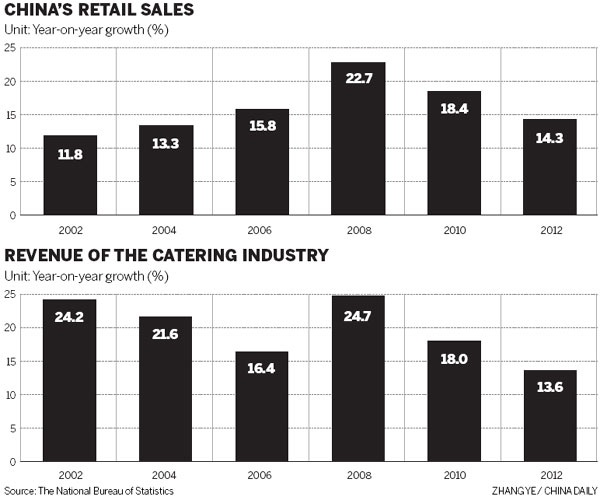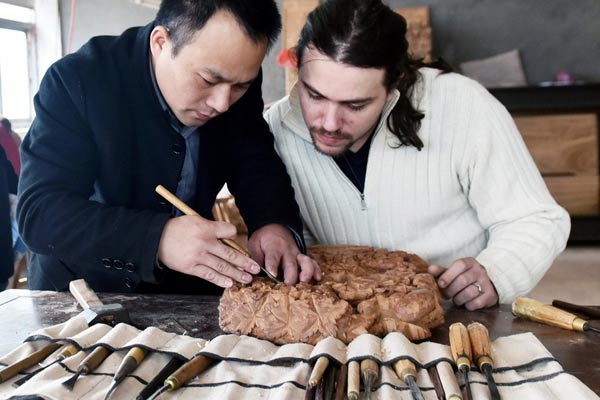New rules mean lean times
|
People dining at a restaurant in Nanjing, in East China'sJiangsuprovince. After the government ordered an end to extravagant meals by people working for State-owned institutions and enterprises, some industrial experts predicted the country's catering industry may suffer indigestion this year. It garnered 2.33 trillion yuan ($374 billion) in revenue last year, ayear-on-yearincrease of 13.6 percent. [Photo/China Daily] |
Huge cut in State-funded banquets leaves its mark on catering industry
The sector experienced a period of fast expansion from the beginning of the 1990s, with annual growth of more than 13 percent, according to a report conducted by Liang Da, a senior economist with the National Bureau of Statistics.
Liang said the annual growth rate of catering industry sales surged to more than 20 percent from 1991 to 2012, when the industry revenue contributed around 18 percent to the growth of total retail sales of social consumer goods.
According to the statistics bureau, the revenue of the country's catering industry reached 2.33 trillion yuan ($374 billion) last year, a year-on-year increase of 13.6 percent. Revenue from restaurants that make more than 2 million yuan a year hit 779.9 billion yuan last year, a year-on-year increase of 12.9 percent.
Industry experts attributed the sizzling success to an improvement in people's living standards, the accelerating pace of life, a trend for dining out as well as an overall increase in business.
However, Beijing unveiled new rules at the end of last year in a bid to stamp out corruption and improve State efficiency. They included banning lavish meals and unnecessary overseas trips as well as over-the-top welcoming ceremonies and the imposition of road blocks to facilitate transport for VIPs.
It has not taken long for restaurants to feel the effects.
The week-long Spring Festival Holiday, which began on Feb 9 this year, is traditionally an opportunity for the Chinese to indulge in shopping sprees and dining out. This year the turnover of high-end restaurants in Beijing decreased by about 35 percent. It fell by more than 20 percent in Shanghai and 30 percent in Zhejiang province, said the Ministry of Commerce.
Data from the China Cuisine Association revealed nearly 60 percent of restaurants canceled dinner reservations during the Chinese Lunar New Year. Most of them were high-end restaurants or five-star hotels.
Ma Wenfeng, a food industry analyst , said the slowdown in the country's catering industry was also caused by the sluggish economy.
He added that annual sales growth across the catering sector was more than 10 percent but over the past several months the rate dropped to 2.5 percent, the slowest rise since the 2003 SARS outbreak.
The country's gross domestic product in the fourth quarter of last year reached 7.9 percent after seven straight quarters of slowing down. It was the slowest year of growth for China since 1999, according to the statistics bureau.
"The industry is facing a new round of reshuffling and adjustment," said Bian Jiang, deputy secretary-general of the China Cuisine Association.
Cheng Hao, the owner of a Yunnan style hot pot chain in Beijing, said he might consider shutting down some of his outlets that are not in prime locations or reporting good returns.
"If the economic situation continues like this, closures are the only way out for me," he said.
Chen Junhai, an executive at Wangshunge Restaurant Group, which has 12 outlets in Beijing, said the move to eradicate public-funded extravagance had been a big blow to many high-end catering businesses.
About 30 percent of Wangshunge's income comes from business customers hosting luxury banquets to entertain VIP guests, Chen said.
"While some restaurants were having a hard time, some companies were using the downturn as an opportunity to readjust their business," Bian said.
Quanjude and Pianyifang roast duck restaurants introduced half-price dishes and smaller portions immediately after the anti-corruption rules were announced. Goubuli and Three Coins restaurants encouraged customers to order only what they could actually eat or take a "doggy bag" home.
"The country's catering industry still has huge room for development despite the downturn because there is great potential in the chain store business model and in untapped markets, such as the countryside market, which need to be further explored," Liang of the statistics bureau said in his report.
Contact the writer at liwoke@chinadaily.com.cn

























